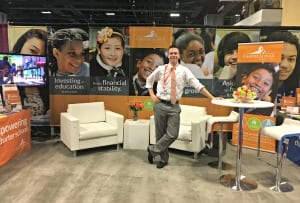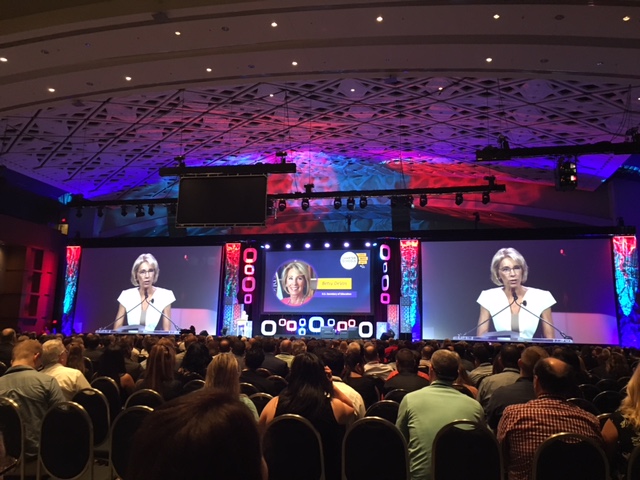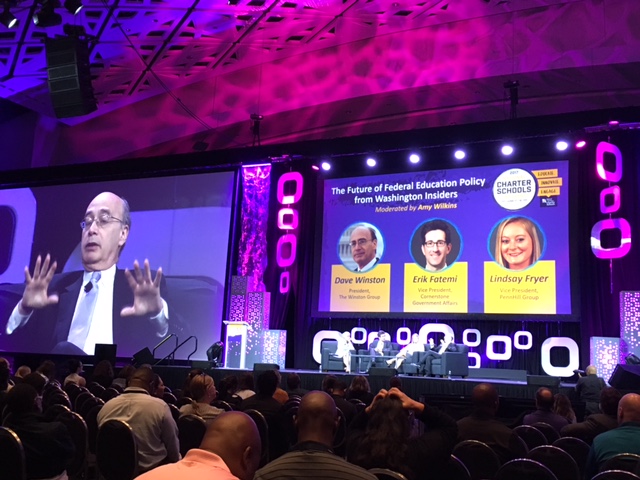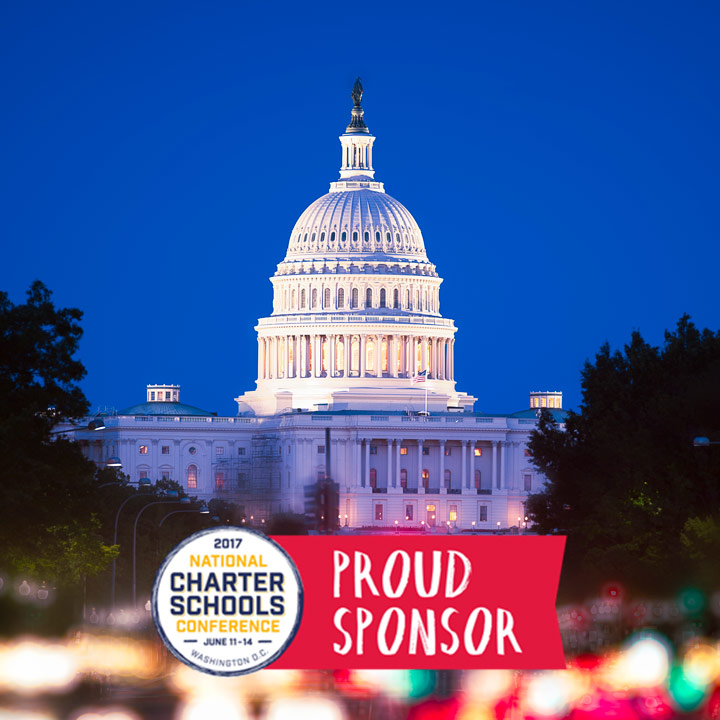 Our last two days at the National Charter Schools Conference were a dynamic mix of great keynotes, our second breakout session and lots of networking at our Booth #501.
Our last two days at the National Charter Schools Conference were a dynamic mix of great keynotes, our second breakout session and lots of networking at our Booth #501.
Tuesday started-off with a keynote by U.S. Secretary of Education, Betsy DeVos followed by a Q&A session facilitated by Derrell Bradford, Executive VP of 50CAN. Many charter leaders in attendance were eager to hear how DeVos planned to support charter schools with the current administration’s education budget cuts. DeVos talked about her early experience working to get the first charter school legislation passed in her home state of Michigan, where her husband also started a charter school focused on aviation and STEM.
Her main message to charter school leaders and advocates was to embrace all forms of school choice, including vouchers and tax credits for private schools. “Whatever your own journey looks like, we’re here because we came to the same conclusion that, as a nation, we are simply not doing a good enough job educating our kids,” said DeVos. Critics state that vouchers will divert funds from public schools — both traditional districts and charters.
 She also warned against becoming another education bureaucracy resistant to other forms of reform, and that charter schools should not be seen as a “cure-all to the ills that beset education.” DeVos summed up her stance this way, “Education is not a zero-sum game. We should not think of it as such. There is no one right way to help kids learn, and just because a school educates children differently than you might propose to does not make them the enemy. Let’s applaud and encourage others who serve students well. It’s a both/and situation, not an either/or.”
She also warned against becoming another education bureaucracy resistant to other forms of reform, and that charter schools should not be seen as a “cure-all to the ills that beset education.” DeVos summed up her stance this way, “Education is not a zero-sum game. We should not think of it as such. There is no one right way to help kids learn, and just because a school educates children differently than you might propose to does not make them the enemy. Let’s applaud and encourage others who serve students well. It’s a both/and situation, not an either/or.”
Other speakers from today’s general session included Marc Sternberg, K-12 Education Program Director of the Walton Family Foundation, Margaret Fortune, President and CEO of Fortune Schools, and last but not least, Reed Hastings, the CEO of Netflix. Although most know him for leading the company that has helped change the way people watch TV and movies, he is also well-known in the charter movement. Hastings has been a board member of KIPP charter schools for 10 years.
Hastings’ speech focused on two current trends in  science — artificial intelligence, robotics and how these two areas contribute toward science and society. So how does this apply to charter schools and schools in general?
science — artificial intelligence, robotics and how these two areas contribute toward science and society. So how does this apply to charter schools and schools in general?
Hastings thinks that technology will continue to play an increasingly central role in education, in particular around personalization. Personalization in technology is what enables apps and services to offer information, content and products that are customized to fit an individual’s taste. Although he believes we will continue to see improvement, but we need to figure out how to deliver it one by one to people. The same concept applies to education – there is more school choice now than ever before, but more work needs to be done to accommodate the unique needs of every student.
His overall message was hopeful, but also requires a show of patience – “human society does change, but it changes slowly. Together, we have the excitement of changing it together.”
We also held our second breakout session on Tuesday, Digital Marketing 101 for Charter Schools – What You Need to Be Successful, which shared tips and best practices for charter schools who are interested in growing their student enrollment and engaging a community through digital marketing. Our panel of experts covered all bases around digital marketing trends and gave a quick rundown of the many tactics that charter schools can test out; including SEO, social media, PPC, retargeting advertising, video marketing, email marketing, and display advertising.
If you missed this session, or our other breakout session, I Need a Better Facility for My School: Now What?, on-demand recordings and slides are available here. You can also watch the Facebook Live recordings of the sessions here as well as on our Facebook page.
Wednesday’s half-day of sessions and the closing session with National Alliance of Public Charter School’s new VP of Advocacy, Amy Wilkins, provided a great wrap-up of many of the themes focused on this week — education, innovation and engagement. The panel particularly addressed ways to get school board members and legislators to take action on education-related bills and budget. Wilkins had two key takeaways: continue to use personal stories to show members why your students and schools are great, and have the courage to push the people whose lobbying we agree with to keep moving forward rather than just focusing on the opposition.

Fellow panel speakers, Dave Winston, President of The Winston Group, Erik Fatemi, VP of Cornerstone Government Affairs, and Lindsay Fryer, VP of the Penn Hill Group discussed the future of federal education policy. Recognizing that the current atmosphere on Capitol Hill is unsettled and tense since the education budget doesn’t reflect both parties’ desires, the panel discussed ways to stay focused on overall advocacy for charter schools and education.
“We must work hard and we must work together to build long-term, sustainable relationships with Congress,” concluded the Honorable Mary Landrieu, Former United States Senator from Louisiana. Her message to attendees — the more compelling your story and more organized your message, the better.
 The California Legislature has passed the budget and education trailer bill on to the Governor Brown fulfilling their constitutional mandate to pass it by June 15th. Similar to the past several years, the education community will see robust funding and one-time dollars that can be spent to augment their programs. Now that the measures are on his desk, the Governor will have 30 days to sign or veto them.
The California Legislature has passed the budget and education trailer bill on to the Governor Brown fulfilling their constitutional mandate to pass it by June 15th. Similar to the past several years, the education community will see robust funding and one-time dollars that can be spent to augment their programs. Now that the measures are on his desk, the Governor will have 30 days to sign or veto them.




